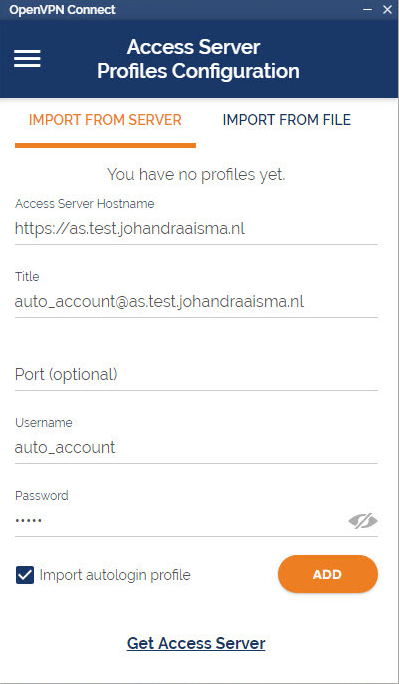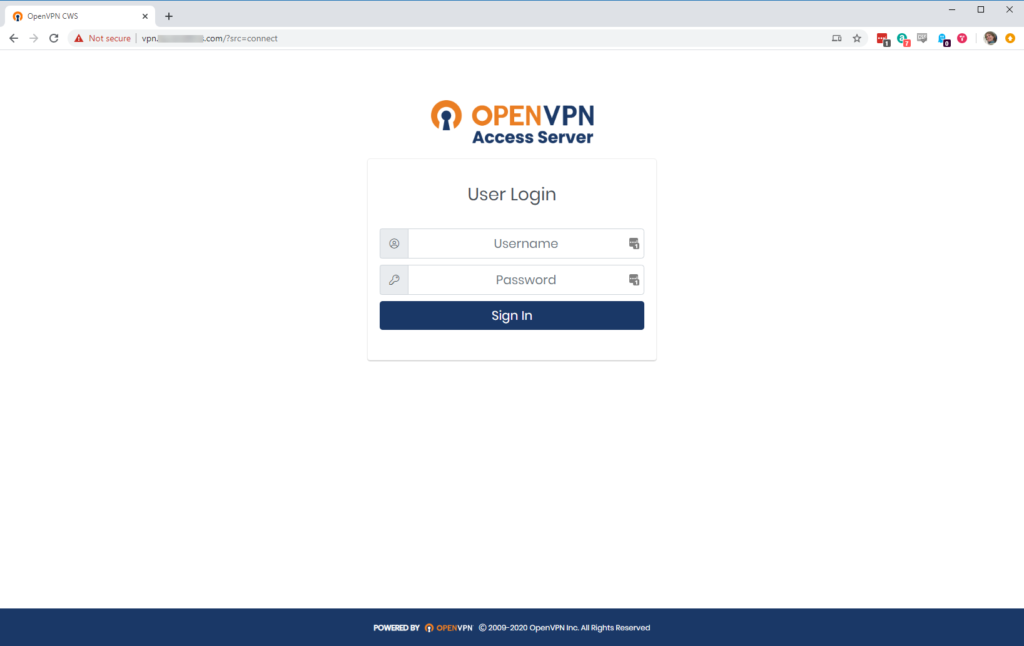
- Openvpn client windows mac os#
- Openvpn client windows install#
- Openvpn client windows driver#
- Openvpn client windows free#
By default they will select one of the AES-GCM ciphers, but this can be influenced using the -data-ciphers setting.Ĭonnections between OpenVPN 2.3 and v2.5 that have no -cipher setting in the config (= defaulting to BF-CBC and not being negotiation-capable) must be updated. BF-CBC is still available, but it needs to be explicitly configured now.įor connections between OpenVPN 2.4 and v2.5 clients and servers, both ends will be able to negotiate a better cipher than BF-CBC.
 EasyRSA3, a modern take on OpenVPN CA managementĬipher handling for the data channel cipher has been significantly changed between OpenVPN 2.3/2.4 and v2.5, most notably there are no "default cipher BF-CBC" anymore because it is no longer considered a reasonable default. Allow unicode search string in -cryptoapicert option.
EasyRSA3, a modern take on OpenVPN CA managementĬipher handling for the data channel cipher has been significantly changed between OpenVPN 2.3/2.4 and v2.5, most notably there are no "default cipher BF-CBC" anymore because it is no longer considered a reasonable default. Allow unicode search string in -cryptoapicert option. Openvpn client windows driver#
Wintun driver support, a faster alternative to tap-windows6. Netlink integration (OpenVPN no longer needs to execute ifconfig/route or ip commands). New option -block-ipv6 to reject all IPv6 packets (ICMPv6). Support IPv4 configs with /31 netmasks now. Asynchronous (deferred) support for client-connect scripts and plugins. Asynchronous (deferred) authentication support for auth-pam plugin. HMAC based auth-token support for seamless reconnects to standalone servers or a group of servers. Removal of BF-CBC support in default configuration (see below for possible incompatibilities). Improved Data channel cipher negotiation. Client-specific tls-crypt keys (-tls-crypt-v2). Improved TLS 1.3 support when using OpenSSL 1.1.1 or newer. ChaCha20-Poly1305 cipher in the OpenVPN data channel (Requires OpenSSL 1.1.0 or newer). It does require some configuring, but ultimately it has no cost for the user. Openvpn client windows free#
OpenVPN Connect has a free version but this version is limited to two connections. OpenVPN Connect is the commercial implementation of OpenVPN. OpenVPN is open source, completely free, and supported by the community. What is the difference between OpenVPN and OpenVPN Connect?
Input url for OpenVPN server or drag and drop config file (you can try VPNBook). Openvpn client windows install#
Execute the download file to install the client on your computer. Download OpenVPN for your operating system. Openvpn client windows mac os#
Control OpenVPN using a GUI on Windows or Mac OS X. Create secure ethernet bridges using virtual tap devices, and. Tunnel networks through connection-oriented stateful firewalls without having to use explicit firewall rules,. Tunnel networks whose public endpoints are dynamic such as DHCP or dial-in clients,. Use real-time adaptive link compression and traffic-shaping to manage link bandwidth utilization,. Use static, pre-shared keys or TLS-based dynamic key exchange,.  Choose between static-key based conventional encryption or certificate-based public key encryption,. Use any cipher, key size, or HMAC digest (for datagram integrity checking) supported by the OpenSSL library,. Use all of the encryption, authentication, and certification features of the OpenSSL library to protect your private network traffic as it transits the internet,. Configure a scalable, load-balanced VPN server farm using one or more machines which can handle thousands of dynamic connections from incoming VPN clients,. Tunnel any IP subnetwork or virtual ethernet adapter over a single UDP or TCP port,. Overall, OpenVPN aims to offer many of the key features of IPSec but with a relatively lightweight footprint. OpenVPN is designed to work with the TUN/TAP virtual networking interface that exists on most platforms. OpenVPN also supports non-encrypted TCP/UDP tunnels.
Choose between static-key based conventional encryption or certificate-based public key encryption,. Use any cipher, key size, or HMAC digest (for datagram integrity checking) supported by the OpenSSL library,. Use all of the encryption, authentication, and certification features of the OpenSSL library to protect your private network traffic as it transits the internet,. Configure a scalable, load-balanced VPN server farm using one or more machines which can handle thousands of dynamic connections from incoming VPN clients,. Tunnel any IP subnetwork or virtual ethernet adapter over a single UDP or TCP port,. Overall, OpenVPN aims to offer many of the key features of IPSec but with a relatively lightweight footprint. OpenVPN is designed to work with the TUN/TAP virtual networking interface that exists on most platforms. OpenVPN also supports non-encrypted TCP/UDP tunnels. 
OpenVPN supports conventional encryption using a pre-shared secret key (Static Key mode) or public key security (SSL/TLS mode) using client & server certificates. OpenVPN is tightly bound to the OpenSSL library, and derives much of its crypto capabilities from it. OpenVPN supports SSL/TLS security, ethernet bridging, TCP or UDP tunnel transport through proxies or NAT, support for dynamic IP addresses and DHCP, scalability to hundreds or thousands of users, and portability to most major OS platforms. OpenVPN is a robust and highly flexible VPN daemon.







 0 kommentar(er)
0 kommentar(er)
